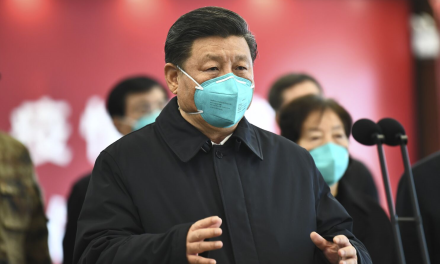BY BRADLEY A. THAYER AND LIANCHAO HAN
A key theater of the Sino-American confrontation is the ideological war between China and the West, yet this aspect largely has been one-sided. China acts vigorously to undermine the position of the West, but the response from the West has been tardy, incoherent and feckless.
It has been so for two reasons. One reason is economic interest of Western business communities — access to the Chinese market has been an enticing siren song. An open secret of China’s rise has been its ability to control Western firms that hope to sell to it. But the price of access to China’s market was that a firm’s knowledge, intellectual property and practices would be siphoned off to aid Chinese competitors, who then would leverage out the Western firm and segue into a global competitor.
China’s exploitation of Western telecom firms laid the foundation for the rise of Huawei, the Chinese firm that hopes to provide the world with its 5G network. As a rule of thumb, China’s success in Western markets typically came about through providing the equivalent product or service at a discounted price. That has been a recipe for great economic success.
Another reason is a historically unique case of Western threat deflation. The West — and the U.S. particularly — consistently and gravely underestimated the dangers and implications of how China’s rise changes international politics, and its ability to threaten and contest longstanding U.S. interests. The ignorance of the China threat was the greatest U.S. grand strategic blunder since the Cold War, and perhaps the most significant in U.S. history.
For decades, U.S. national security and business decision-makers have viewed international politics through the mindset of the Hegelian “End of History,” popularized by Francis Fukuyama. In this account, the world was inexorably moving toward democracy and free-market economics. Aiding China would be a “win-win” for China and for the U.S.
This idealistic view was disastrous for U.S. foreign, defense and economic policies. Indeed, it remains so, as the interminable half-life of this sanguine perspective still contributes to a delayed response to China’s expansion — this is especially so on Wall Street. This mindset is fundamentally pernicious as it is wrong, and it contributes to a dangerously pollyannaish and self-satisfied view of the U.S. position in the world. Moreover, it is demonstrably not shared by the rivals of the United States.
However, this bleak strategic landscape may be changing as more people are willing to “throw their hats in the ring” of the ideological confrontation with China.
Movie director Quentin Tarantino’s reported refusal to re-cut his film “Once Upon a Time” in Hollywood to placate Chinese censors ensures that Sony will not be able to release the film in the large Chinese market. Of course, however influential, Tarantino is only one director. Nonetheless, his action deserves to be lauded and stands in contrast to Hollywood’s avoidance and neglect of China’s human rights abuses on the big screen, or craven portrayal of China as the Chinese Communist Party (CCP) desires.
The considerable critical response both to the National Basketball Association’s leadership and superstar LeBron James’ disparagement of Houston Rockets general manager Daryl Morey’s tweet in support of the Hong Kong protesters suggests that Beijing no longer may shape the narrative as it wishes. The fact that so many Americans enjoy the sport awakened many to the cause of the Hong Kong protests, to the despotic control the People’s Republic of China (PRC) seeks to impose on Americans, and to how spineless — at least, in their initial, instinctive reaction — businesses often are in the face of Chinese pressure.
Steve Bannon’s new film “Claws of the Red Dragon” is an important fictionalized account of Huawei’s Meng Wanzhou’s arrest in Canada for extradition to the U.S. and its consequences. It is the first film to address this topic and provides an insightful exploration of the deeper issue of how the PRC penetrated Western markets and, ultimately, societies, as well as their objective. The PRC did so to gain access, prevent awareness in the West of the negative consequences of China’s rise, and to forestall any Western response to hinder it, through bribery or coercion of individuals, firms and states.
The stark, ideological choice presented in the film directly mirrors the choice today: Working with China and Chinese firms is lucrative, to be sure, but only serves to aid China’s global ambitions, which ultimately will cost Western societies their freedoms. Additionally, the film is significant because it shows what popular culture can accomplish and that, at long last, the U.S. has tossed its hat in the ring in the ideological war.
The common thread in these events is that, at the level of popular culture, there is an awareness of the China threat. The world China would create is one where Western freedoms and liberties are eroded, and finally extinguished, in favor of the political principles advanced by the repressive CCP. Working with China is a “win-win” for China’s businesses and the Chinese Communist Party. It the reverse for the West. If the West’s hat is to remain in the ring, these early actions must be reinforced by a whole of society response.
This article first appeared in The Hill on 10/23/19 9:00 AM ET



















